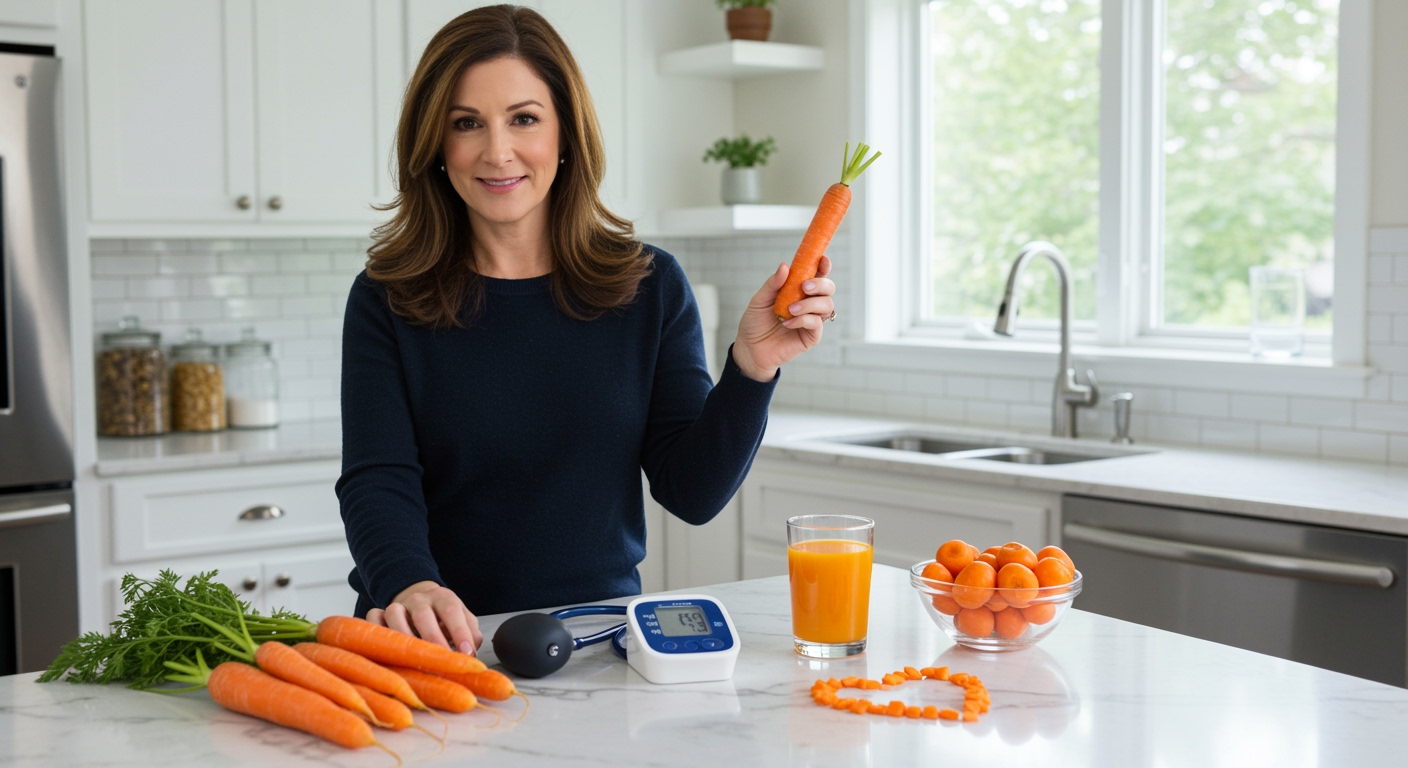✪ Key Takeaway: Carrots can help lower blood pressure through potassium content and antioxidants that support heart health.
Introduction
Your doctor tells you to watch your blood pressure, but nobody mentions the orange vegetable sitting in your refrigerator.
You might be wondering if something as simple as carrots could actually make a difference in your blood pressure readings.
Hi, I’m Abdur, your nutrition coach and today I’m going to explain exactly how carrots affect your blood pressure and whether they deserve a place in your heart-healthy eating plan.
What Makes Carrots Good for Blood Pressure?
Carrots contain several compounds that directly support healthy blood pressure levels.
The most important nutrient is potassium, which helps your kidneys remove excess sodium from your body.
When sodium levels drop, your blood vessels can relax and your heart doesn’t have to work as hard to pump blood.
One medium carrot provides about 230 milligrams of potassium, which is roughly 5% of your daily needs.
Carrots also contain beta-carotene, a powerful antioxidant that protects your blood vessels from damage.
This protection helps maintain the flexibility of your arteries, allowing blood to flow more easily and reducing pressure on your cardiovascular system.
The fiber in carrots also plays a role by helping your body maintain steady blood sugar levels, which indirectly supports healthy blood pressure.
✪ Fact: One cup of raw carrots contains more potassium than a small banana.
How Much Difference Can Carrots Actually Make?
Research shows that people who eat more potassium-rich vegetables like carrots tend to have lower blood pressure readings.
A study published in the American Journal of Clinical Nutrition found that increasing potassium intake by just 1,000 milligrams per day could reduce systolic blood pressure by 2-3 mmHg.
That might not sound like much, but even small reductions in blood pressure can significantly lower your risk of heart disease and stroke.
The antioxidants in carrots provide additional benefits by reducing inflammation in your blood vessels.
Chronic inflammation makes your arteries stiff and narrow, which forces your heart to pump harder to move blood through your body.
By eating carrots regularly, you’re giving your body tools to fight this inflammation and keep your blood vessels healthy and flexible.
However, carrots alone won’t fix high blood pressure if you’re eating a diet high in processed foods, excess sodium, and refined sugars.
✪ Pro Tip: Eat carrots with a small amount of healthy fat to boost beta-carotene absorption.
What’s the Best Way to Eat Carrots for Blood Pressure?
Raw carrots provide the most potassium and fiber, making them excellent for blood pressure control.
However, lightly cooked carrots can be easier to digest and may help your body absorb more beta-carotene.
Steam or roast carrots instead of boiling them, because boiling leaches out water-soluble nutrients like potassium.
Carrot juice concentrates the nutrients but removes most of the fiber, so whole carrots are generally a better choice for overall health.
If you do drink carrot juice, limit yourself to 4-6 ounces per day because it’s high in natural sugars.
Adding carrots to salads, soups, and stir-fries is an easy way to increase your daily intake without thinking about it.
Baby carrots make convenient snacks, but whole carrots are often fresher and contain more nutrients per serving.
✪ Note: Organic carrots may contain higher levels of beneficial compounds than conventional ones.
Are There Any Risks or Limitations?
Carrots are generally safe for most people, but there are a few things to keep in mind.
Eating extremely large amounts of carrots can cause a harmless condition called carotenemia, where your skin turns slightly orange.
This happens when you consume more beta-carotene than your body can process, but it reverses when you reduce your intake.
People with diabetes should monitor their blood sugar when eating large amounts of carrots, as they do contain natural sugars.
If you’re taking blood pressure medications, don’t stop taking them and rely only on dietary changes like adding carrots.
Always work with your healthcare provider to monitor your blood pressure and adjust medications as needed when making dietary changes.
Carrots work best as part of a comprehensive approach that includes reducing sodium, maintaining a healthy weight, and staying physically active.
✪ Pro Tip: Track your blood pressure readings when adding more carrots to see your personal response.
The Bottom Line
Carrots can definitely support healthy blood pressure through their potassium content, antioxidants, and fiber.
Small dietary changes like adding carrots create the foundation for big health improvements over time.
I’d love to hear about your experience with carrots and blood pressure management, so please share your thoughts or questions in the comments below.
References
At NutritionCrown, we use quality and credible sources to ensure our content is accurate and trustworthy. Below are the sources referenced in creating this article:
- PMC: Dietary potassium and cardiovascular disease
- Kansas State University: Carrots may be good for your heart
- PMC: Antioxidants and cardiovascular disease
- WebMD: Benefits of carrots





